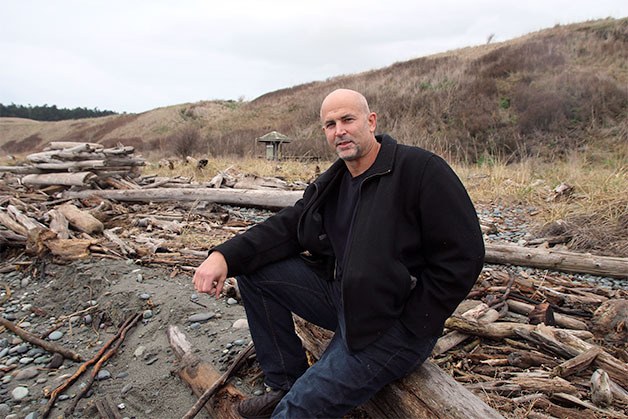James Franco was involved in at least one movie this year that is unlikely to raise the ire of a nuclear-armed, Communist dictator.
Donning his art-house director’s hat, the comely Hollywood star is bringing a book with a Whidbey Island connection to the silver screen.
Caleb Powell, a 1986 graduate of Coupeville High School, and his former University of Washington professor, David Shields, created a one-of-a-kind dissertation on art and life by traveling to the mountains and arguing for days. They turned a transcribed, edited version of their verbal skirmishes into a book, “I Think You’re Totally Wrong: A Quarrel,” which has been published by Knopf this year.
Franco, also a former student of Shields’, got his hands on the a draft of the book and decided to turn it into a movie. One year ago, Powell and Shields argued in front of movie cameras; Franco is now trying to get the movie accepted into film festivals with the hope that a distributor will pick it up.
It’s been an exciting few years for Powell, a stay-at-home dad and writer in Seattle.
Powell has strong connections to Coupeville. His parents still live in his boyhood home on the banks of Penn Cove and he keeps in touch with many Central Whidbey families.
Although he’s an up-and-coming writer — he hopes — who’s steeped in literary culture, Powell said he was a typical kid growing up in Coupeville. He was a jock and the school’s quarterback until a serious car accident put him into a coma for four days. He said the accident changed his perspective on life, but he didn’t become seriously interested in writing, literature or even politics until his college years and beyond.
Still, one thing he’s always been good at, he said, is arguing.
“I’ve always been argumentative with people,” he said. “Always played the devil’s advocate.”
Apparently it runs in the family.
In 1993, he explained, he wrote a letter to the Whidbey News-Times expressing support for allowing openly gay people to serve in the military. His father wrote a letter in response, arguing in no uncertain terms that his son was wrong.
Yet it was Powell’s penchant for arguing, for asserting a position without blinking, that ultimately drew Shields to him.
The two men first met when Powell was a student in Shields’ writing course but then went their separate ways for more than a decade.
Shields became an established, award-winning and prolific writer. His book, “Reality Hunger,” earned him a visit to the “Colbert Report” television show.
Meanwhile, Powell moved to the United Arab Emirates and then back to Seattle, where he is the married father of three girls. He wrote a coming-of-age novel, “This seething ocean, that damned eagle,” and other works, but mainstream success has eluded him.
Powell said he eventually reconnected with Shields, but that — ironically — became an argument after the professor initially refused to “blurb” his work.
Shields said he came up with the idea for a book that would play with the tradition of Plato and Socrates, student and teacher. He said he wanted to argue with someone who could challenge his deeply held ideals about art, life and culture.
“I wanted to see if someone could completely torpedo my world view, my view of art,” he said.
Shields said he initially approached others, but the preparatory discussions often became too angry and contentious. But then he turned to Powell and found his perfect foil.
“No one is as quarrelsome and contrary as Caleb,” he said. “If I say it’s black, he’ll say it’s white. In many ways, he is my perfect antithesis.”
At the same time, Shields said Powell understands the playfulness and showmanship involved in a good argument.
After preparing for a year, the two men headed into the mountains for four days of quarreling. They taped the entire discussion and then edited it down on paper.
Although the resulting discussion ranges a wide swath of subject matter — from the deeply personal to the stuffy — Powell said it’s ultimately focused on the relationship between life and art.
“To my slight relief, I was able to defend my views,” Shields said. “…I was able to muster an argument.”
Shields said he was teaching at the Warren Wilson College in North Carolina when he shared a draft of the book with Franco, who was a student in the master of fine arts program. The actor/director/writer read it overnight and announced to Shields that he wanted to make it into a movie.

Powell said he was actually on Whidbey Island when he heard the news. He was excited but realistic about the prospects that a film would really become a priority.
But then Franco called Shields and invited them down to shoot the film near Los Angeles. The original idea was to recreate the arguments from the book.
Serendipitously, Shields said, a real-life argument over issues at the heart of the book broke out between himself, Powell and Franco.
As a result, much of the focus of the movie is on the real quarrels. Franco is in the film, playing himself and arguing his views.
Powell said it was definitely a kick to work with someone as famous as Franco, who also cares deeply about art.
He hasn’t had a chance to discuss “The Interview” with Franco, but he certainly has an opinion about it. He said it’s simply absurd that Sony would give in to terroristic threats and pull the movie, which stars Seth Rogen and Franco.
The comedy prompted an international incident after U.S. officials said North Korea had hacked Sony’s computers and leaked executives’ emails in retaliation. The film is about two Americans’ plot to assassinate North Korean leader Kim Jong Un.
Most importantly for Powell, a brush with Hollywood has made him more interesting to younger relatives.
“I’ve definitely shot up a lot in the cool uncle department,” he said.


